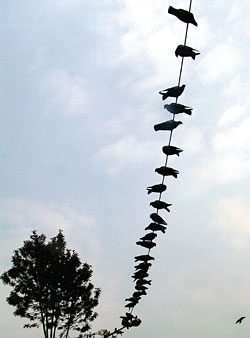|
|
Every day that goes by during this heady hiatus, the Maoists are taking themselves further out of the jungles from which they came. Ahead lie the challenges of statecraft and the politics of compromise.
This can be a powerful culture shock to comrades who are habituated to the absolute certainties of revolution. They have been used to the 'scientific' analysis of the dialectics of class struggle. Like doctrinaire communists of a bygone era, they think they have all the answers. Their revolution, after all, had no space for doubters, revisionists, and reformers.
Well, welcome to the real world. When Maoist MPs enter the jam-packed interior of the interim parliament one day soon, they will have to remember that no one elected them. They got there by wielding political power that came out of the barrel of the gun. As a price of peace, the Nepali people were willing to temporarily hand over to the Maoists nearly a third of the seats in the House of Representatives. 
The path ahead will not be easy, but it will be made more difficult if the Maoists continue their corrosive coercion and try to undermine a multiparty polity. They can't have it both ways: they can't be in an interim government without formally forsaking violence. Even if some of their arms are contained in cantonments everyone knows they can still insinuate violence.
And why is Pushpa Kamal Dahal suddenly pushing for Indian ex-Gurkhas to monitor arms management until the UN gets its act together? Of course the UN takes time, 'delay' is the UN's middle name. The reason this tricky monitoring mechanism has credibility is because the UN is involved, let's not get Nepalis with possible conflict of interest to manage arms.
Ironic, isn't it, that the very success of the Maoist armed struggle was that it ultimately forced them to give up armed struggle. To convert his fighters' dramatic gains into political power, Pushpa Kamal Dahal had no other option but to agree to lock up his arms. It was not an easy decision, given the fissures in his movement. Already, the Maoist leadership has a splinter group causing havoc in parts of the tarai. Unlike the rest of Nepal, people in places like Siraha still endure bombs and assassinations and haven't known peace.
It must be tempting for royal reactionaries and the saffronites to incite ethnic unrest in the tinder dry tarai. If King Gyanendra, however indirectly, supports this he'll have made his third and last mistake and will have to relocate. The throne he is on is hanging by a slender thread. The only way he can preserve it, if at all, is by sitting perfectly still until the people decide on his fate.



